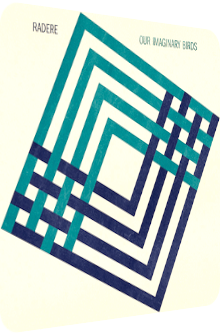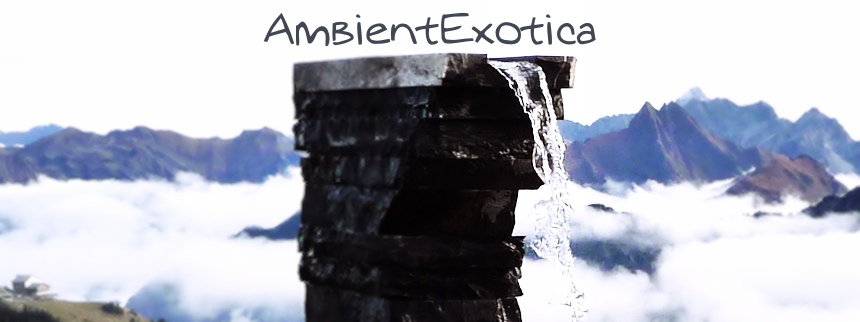
Radere
Our Imaginary Birds
2011
Radere is the Ambient/Drone project of Boulder, Colorado-based Carl Ritger whose two-track work Our Imaginary Birds was released in April 2011 on the Moongadget label. It is available to purchase and listen to in full via this Bandcamp link. The month of April is as good as any to release Ambient music, but Our Imaginary Birds is best enjoyed in or near this very month when spring is at its peak with all the implications that come with it: changing weather, cold rain showers, blossoming flowers and trees. The two long compositions are exactly placed in this seasonal location. Radere’s pieces shuttle between a glaring brightness and a darker but nonetheless content mood. They may be strictly loop-based, but the artist makes sure that the wealth of layers, slight shifts and mercurial traces build a superimposition that is nothing short of enchanting. While nowhere mentioned in the descriptive tags of the album, I can firmly place this work near the Pop Ambient genre where memorable melodies are as important as gleaming synth surfaces and cascading particles. The melody side is admittedly less important here, but the interactions between the different stratifications prove to be resplendent. Actually, the aesthetic concept – or the full package, so to speak – is a ternary one with three equipollent parts, but more about this in the final paragraph. I am taking a closer look onto the characteristic traits of both tracks, with a final evaluation of their soothing qualities afterwards.
The first track is called A Jolly Gentleman Of Home & Orchard, an 18+ minutes long effervescent Drone piece. Fading in ever so slowly with a gorgeously auroral layer of solemn tranquility, glistening pulses and equilibrated celestial chimes, there is no doubt about the rapturous conviviality in major. The listener is encapsulated in a balm of soothing legato washes, but is allocated enough air to not feel entirely swallowed by the coalescent layers. There is a three-note melody hidden in-between the ceremonial luminosity, but its golden shimmer is purposefully blurry and deeply embedded. The serene scenery is maintained throughout the runtime, causing a trance-like state of the mind by offering the possibility to literally feast on the tasteful monotony of the drones, especially so since this monotony comprises several entangled coatings which can be analyzed much better during such a long duration. The arrangement does change, however. After approximately eight minutes, the tones become even more streamlined and silkened and reach their peak in voluminosity. Occasional clicks and splutters function as time markers and remind of the fact that time actually flies. A Jolly Gentleman Of Home & Orchard is a proper Drone track, tremendously uplifting and felicitous, only infinitesimally meandering and changing, but all the more vivacious. This is one of those tracks that could have been shortened by 13 minutes and featured on Kompakt’s Pop Ambient series, but then its amicable state would not have evoked the same strong vortex of epicurean feelings. The fundament of this first track does not even feature identifiable classic instruments such as a piano or guitar which is, to my mind, a nice change of pace in the ever-growing amount of Modern Classical-inspired Drone pieces. If such instruments are used – the Moongadget label mentions a processed guitar –, they are perfectly masked in the synth concoction. A wonderful composition.
Of Air-Borne Grace & Finality is the second offering and opens in a much colder fashion. The decrease in vibrancy is compensated by the plasticity of the field recording which depicts a rain shower with distant gales. Whereas Carl Ritger kept the volume level intact in the first track, he chooses a wave-like structure with ebbs and flows. The ensuing fragility and organic soul makes each layer more transparent. A spectral melody of haze is unleashed and is spliced together by a seraphic brighter part and an accentuating darker foil which augments the thermal heat and wafts gently around the scintillating nucleus. Not only is the melodious layer diffuse and grainy, but seems to hail from a distance. This state of affairs makes it partially colder but still mellow enough. The thermal trait of this tone sequence is the best description I can come up with; it underpins its gaseous existence and clarifies the crucial alteration in comparison to the first track. Whereas A Jolly Gentleman Of Home & Orchard provides a flowing stream, Of Air-Borne Grace & Finality whirls and wafts through the air. The track title furthermore points to this assumption. The warmth in the background forms a splendid counterpart to the refreshing but bleak rain drops and reminds of Markus Guentner’s Chrom (2003), at least texture-wise. Taking a look at the macrostructure, it turns out that this is another strictly loop-based track. This artificial continuance conflates with the organic field recording which itself must certainly have an angular point. That certain point, however, is hidden from the listener. Of Air-Borne Grace & Finality might not be as neon-colored and pompous as the first track, but it contains the same spirit, is thematically resemblant and in a way even more majestic, if not via its amount of layers, then due to its pastel color palette and a more considerate interdependency.
Our Imaginary Birds is a declaration of love to the timeframe known as spring. This comes as no surprise since Carl Ritger himself states this fact in the liner notes. It is not even a particularly peerless concept. The music itself therefore needs to shine, and this is exactly what happens in both tracks. The flamboyant glare of A Jolly Gentleman Of Home & Orchard transfigures the scents and shimmering play of colors into elysian fields. The density of the layers is overwhelming but not convoluted or eclectic. Radere’s track is deliberately accessible, beguiles the listener and lets him or her float along in the stream of happiness. While my description may sound overly esoteric, let me assure you that both the luminescence and the reciprocating micro-oscillations of the strata expand the feeling of happiness even more. I tend to believe that I spot a three-note melody in this synth river, but I am not sure. Due to the lack of fully carved out melodies – naturally a perfectly common situation in the Drone genre –, it is the textures that are all the more important, and the vitality and verdure of them are magnificent. The second track Of Air-Borne Grace & Finality shuttles between quieter passages and wraithlike synths, the latter of which are underlined by warm breezes. The ensuing silence between the zenith of each loop is covered by the field recording of rain, an important ingredient of springtime. The mood is not as bright and joyful rather than solemn and positively contemplative. Both tracks have in common that they could have been easily shortened and turned to compilation-friendly lengths. They have not. Carl Ritger, it turns out, does not focus on the textures or melodies alone, but is keen to induce a blissful state, a transition between an awe-inspired listener who is first entranced by the delicate textures and then lost in the meditative loops. The duration of both tracks is a selling point as well. Our Imaginary Birds only works so well due to the trinity of textures first, melodies second, duration third. This formulaic assertion is not meant to forcefully encompass an artificial context, neither does it destroy the music nor put it into a tight corset. Both tracks gleam and glisten and are pitch-perfect examples of serene zone-out formations. What lies behind their veils is at least as important as the veils themselves.
Further listening and reading:
- You can purchase and listen to Our Imaginary Birds in full via this Bandcamp link.
- Follow Radere on Twitter: @falsereactions.
Ambient Review 192: Radere – Our Imaginary Birds (2011). Originally published on Mar. 13, 2013 at AmbientExotica.com.
